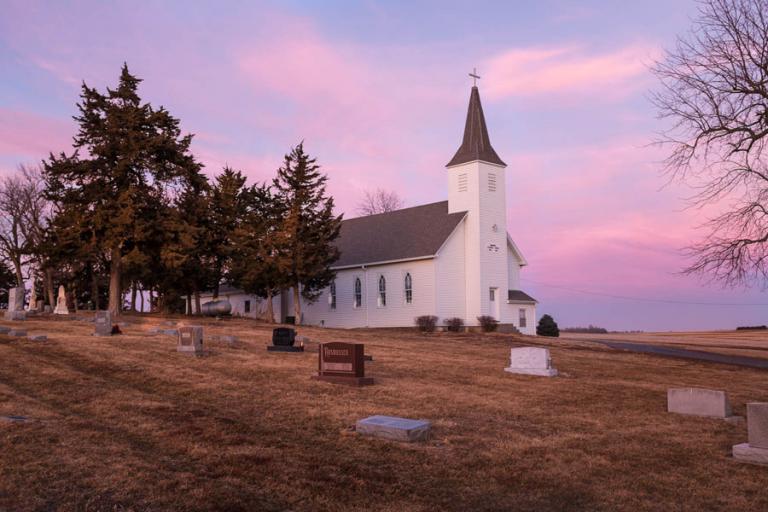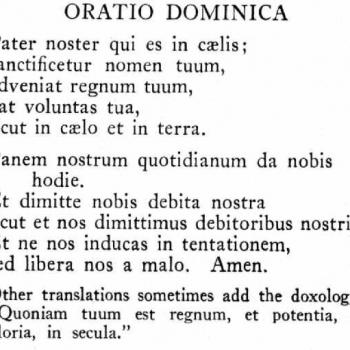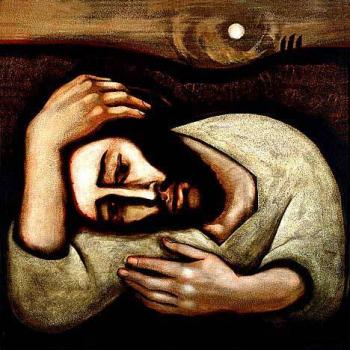As we forgive those who sin against us.
I knew a man who would clamp his mouth if he had to say “as we forgive those who sin against us.” The woman who had killed his son was a member in the same church.
My first week in my first parish as a new Lutheran pastor, I drove out to the small country church, half of the two-congregation parish I served. I wanted to look it over for the first time.
I saw a guy watering flowers in the church cemetery. It was George. He took me on a tour of the grave stones and in about twenty minutes I knew more dead parishioners than live ones. He took me to a new marker.
“That’s my son; car accident.” Jason, 17 in 1978, was killed 2 years before I arrived in the parish.
This brings me to Ethel, another parishioner. Ethel had glaucoma. Her vision was narrowing, like she was seeing through a tunnel. Her license should have revoked years before, but it was a small rural county, 16,000 tops, and county DMV made allowances; in that small community, she was probably related to some of them. She should have voluntarily surrendered it, or her doctor should have taken it. But she was a farm wife, and a farm wife who could not run errands and get her own groceries, given the sometimes harsh practicalities of rural life, would have made her pretty useless.

Ethel was no longer driving when I met her. She had stopped driving 2 years before when, on a hazy late afternoon at a gravel-road intersection, she T-boned Jason’s car broadside and killed him outright. When it came to the Lord’s Prayer, forgiving others, George told me he’d shut up if it meant Ethel was in the deal. He couldn’t pray it. He couldn’t force the words from his mouth.
The worst thing that ever happened to George and his wife was Jason’s death. The youngest of 3 children, the others grown and gone, Jason was the son born to continue the farm into its fourth generation. Yet the woman responsible for his death was there in that little church every Sunday, George seated to the front, she to the rear. He was polite, but he could not speak those words “as we forgive.”
Nor could he banish those words from his mind and there they rattled, giving the Holy Spirit something to work with.
I’m not going to tell you that George had a healing change of heart one day and everything suddenly was rainbows and unicorns. He didn’t, and it wasn’t. It’s never like that.
Forgiving others is painful work. Some sins we are asked to forgive are true burdens of the cross, and we endure both the forgiveness and the offense through life. So this isn’t a story of “forgive and forget.” I do not think there is ever any “forgetting.”
But once forgiveness is said, aloud or by gesture or deed, there it takes on a reality that cannot be shaken. “Oh, I forgave her.” Remembering Jason’s death doubtlessly returned like PTSD, and Ethel’s role unquestionably arose again and again. But over all that, subsuming all that, were those words: forgive as we have been forgiven.
Passing the peace one Sunday, I don’t know know how long after Jason’s death, George deliberately left his pew in the front, walked length of the aisle to the rear where Ethel stood. There he shared the peace of Christ with the woman who had killed his son. George did not tell me this story. Ethel did. But everybody knew it; they had seen it.
It became apparent to me that talk of forgiveness in that little church carried the tension, the intensity, and the unqualified drama of grace. Those two people, George and Ethel, became two of the lay people to shape my pastoral ministry thereafter: the forgiver, the forgiven. For George, it was what he had to do, and did it rather impulsively as he thought about it. For Ethel, it was what she had to receive, which in its way is nearly as difficult.
Ethel died many years ago; George too, as I hear. But this story, it lives still.
Jesus has a way of softening up the conscience. When we begin to think of ourselves as in Christ, then we begin to examine ourselves by his death for us and fittingly, for our neighbor too. Forgiving others isn’t a snippet of moral instruction. It is root and branch of our New Creation in Christ. The more we become aware that it was for my sins that Christ died, the more we are moved to pray “forgive us our sins,” and then we are relentlessly stirred to say, “as we forgive those who sin against us.”
Here we ask God to help us to be gracious to our neighbors, in the same way God has been gracious to us. Christ’s word not only challenges us to forgive as we have been forgiven. His word also teaches us to seek his strength that we may rely on his courage, his love rather than our own, to forgive others.
Because Christ is raised, we know he will not only forgive us our inability to forgive, but at the same time he will also continue to work in us and upon us until we are brought to the place where — in our love of Christ and of neighbor — we can do nothing else but forgive.
Russell E. Saltzman lives in Kansas City, Missouri. His latest book is Speaking of the Dead. He can be reached at [email protected] and on Twitter @RESaltzman.












